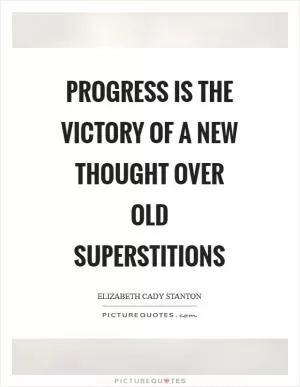The religious superstitions of women perpetuate their bondage more than all other adverse influences

The religious superstitions of women perpetuate their bondage more than all other adverse influences
Elizabeth Cady Stanton was a prominent figure in the women's rights movement in the 19th century, and she was known for her strong beliefs in gender equality and women's liberation. One of the key issues that Stanton addressed in her writings and speeches was the role of religion in perpetuating women's oppression. She argued that religious superstitions played a significant role in keeping women in a state of bondage, more so than any other adverse influences.Stanton believed that religious teachings often reinforced traditional gender roles and stereotypes that limited women's freedom and autonomy. She argued that many religious doctrines portrayed women as inherently inferior to men, and that they were meant to be subservient and obedient to male authority. These beliefs were often used to justify the unequal treatment of women in society, and to deny them access to education, employment, and political rights.
Stanton also criticized the ways in which religious superstitions were used to control women's behavior and choices. She pointed out that many religious traditions imposed strict moral codes on women, dictating how they should dress, speak, and behave. These restrictions served to limit women's personal freedom and autonomy, and to reinforce their dependence on male authority figures.
Furthermore, Stanton argued that religious superstitions often perpetuated harmful myths and stereotypes about women's sexuality and reproductive health. She believed that many religious teachings promoted the idea that women were inherently sinful and impure, and that they needed to be controlled and regulated in order to maintain social order. These beliefs led to the stigmatization of women who did not conform to traditional gender norms, and to the denial of their sexual and reproductive rights.












 Friendship Quotes
Friendship Quotes Love Quotes
Love Quotes Life Quotes
Life Quotes Funny Quotes
Funny Quotes Motivational Quotes
Motivational Quotes Inspirational Quotes
Inspirational Quotes